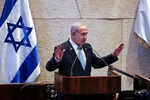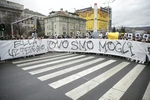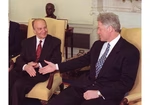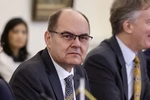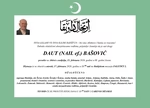
The US has to tend to the problems between Serbia and Kosovo simultaneously with the one in Bosnia and Herzegovina, where the Bosnian Serb leader Milorad Dodik is blocking all progress, experts told the US Senate Committee during a hearing on Wednesday evening.
Among the speakers were the State Department’s Special Envoy for the Western Balkans, Matthew Palmer, Senior Fellow at the Center for European Policy Analysis (CEPA), Janusz Bugajski and Professor at the John Hopkins University in Washington DC, Majda Ruge.
"We continue to find leadership at both the entity and state levels to be disappointing, parochial, nationalistic, and risk-averse, doing little to help ordinary citizens,” Palmer said.
However, he added that “as a new generation of political leaders emerge at the cantonal and municipal levels, particularly in the Sarajevo Canton, there is reason to be hopeful.”
“We continue to be optimistic that Bosnia and Herzegovina can succeed, and as a guarantor of the Dayton Peace Accords, we remain committed to the territorial integrity and sovereignty of the country,” the Special Envoy said.
“We are supporting efforts to reach an agreement or a compromise that allows for government formation at all levels as well as submission of Bosnia’s ANP to NATO,” Palmer said of Bosnia’s political crisis.
Bosnia has not formed a government - officially called the Council of Ministers - since the October 2018 election because the Bosniak and Croat members of the tripartite Presidency refuse to vote for the new prime minister.
The new head of government is supposed to come from the Bosnian Serb ruling Alliance of Independent Social Democrats (SNSD), but the party opposes the country’s path toward NATO membership and announced it would not allow the next step in this direction to be made.
Sending the Annual National Programme (ANP) is the next step, and the Bosniak and Croat Presidency members insist on it.
Palmer explained that there were several attempts to implement reforms in the country in the past but that the processes but that this not happening fast enough.
“Those who block changes are those who benefit the most from such a situation in the Balkans,” he said, emphasising electoral reform as one of the key priorities.
“We are trying to create pressure so the Council of Ministers is formed and the ANP is sent, but the main obstacle in this is Milorad Dodik, who blocks anything that would bring about progress,” he said.
Janusz Bugajski said that the US should seriously consider naming a special envoy for Bosnia who would commit to resolving the problems in the country.
“Bosnia is not a multiethnic country, but a union of ethnic fiefdoms in which nationalist parties maintain the status quo in order to protect their plunder in their patronage networks. Bosnia and Herzegovina does not have an efficient central government, the Serb entity is persistently threatening with secession, Croat nationalists are demanding a third entity more and more, and Bosniaks are in the middle, preoccupied with their frustrations,” Bugajski said.
He explained that Bosnian Serb leader Milorad Dodik has been threatening he will work against numerous reforms in the country, including the Armed Forces, state court and police agency.
All of these institutions were formed after the 1995 Dayton Peace Agreement, and Dodik has been complaining that they are the result of pressure from the international community. He has been working toward strengthening the competencies of Bosnia’s two entities, especially the Serb-dominated Republika Srpska (RS), and has voiced opposition to any strengthening of state institutions.
“In this atmosphere of state paralysis, the Serb entity has continuously been moving from autonomy toward sovereignty and its leaders have, with financial and political support from Moscow, raised the prospect of secession and unification with Serbia,” Bugajski said.
This has also encouraged Bosnian Croat politicians to seek a third entity and the division of FBiH, he argued.
“Meanwhile, Bosniak Muslim leaders have warned of a new war, as they are committed to defending the territorial and constitutional integrity of Bosnia,” Bugajski stressed.
Ruge expressed a similar opinion but explained that “any approach which involves border changes risks producing unintended consequences.”
She argued that US officials even mentioning such a possibility is dangerous as it encourages those who promote ideas of secession, such as Milorad Dodik and Republika Srpska.
Ruge then went on to “remind this committee that across the region, ethnic tensions are not the most important cause of political instability.”
She cited a recent poll by the International Republican Institute which found that more than 50 percent of citizens in Bosnia identified organised crime as “the number one security threat in the country, not members of other ethnic groups.”
Kakvo je tvoje mišljenje o ovome?
Učestvuj u diskusiji ili pročitaj komentare





 Srbija
Srbija
 Hrvatska
Hrvatska
 Slovenija
Slovenija















